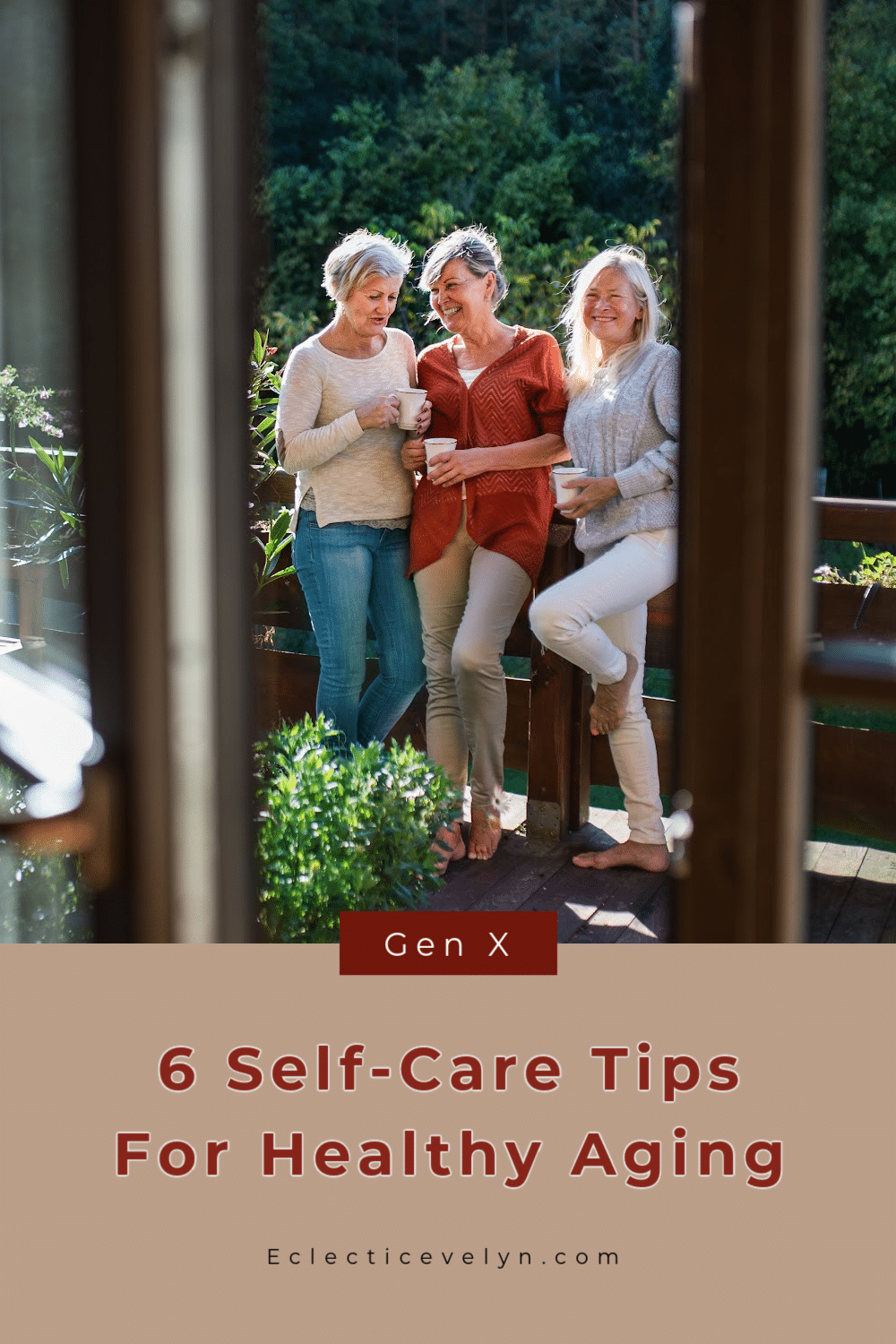Remember the youthful energy and zest for life you had in your younger days? Believe it or not, you can still tap into that vitality, even as you get older. Remember, we are Gen X and we do aging differently.
The key to healthy aging lies in prioritizing your well-being through self-care. By nurturing your body, mind, and social connections, you can embrace a fulfilling and healthy second chapter. This blog post explores six essential self-care tips that will empower you to live life to the fullest as you age. Remember before incorporating any change,s consult with a medical provider.
1. Move Your Body and Feel Energized
Staying active is more than just maintaining a healthy weight. As we age, regular exercise becomes even more crucial for strengthening muscles and bones, improving flexibility, and boosting energy levels. But why settle for the typical routine? Consider exploring options that bring joy and keep you engaged.
Join a fitness class: Senior-specific fitness classes designed for different activity levels allow you to exercise in a supportive and social environment. From low-impact Zumba to water aerobics, there’s something for everyone.
Discover the outdoors: Go for brisk walks in nature, explore hiking trails, or join a group for tai chi sessions in the park. Immersing yourself in greenery can also reduce stress and promote mental well-being.
Dance like nobody’s watching: Turn on your favorite music and groove around your living room! Dancing is a fun and effective way to get your heart rate up, improve coordination, and even boost cognitive function.

2. Nurture Your Mind and Spirit
A positive outlook is a golden ingredient for healthy aging. Cultivating gratitude is a powerful tool to achieve this. Start by journaling about three things you’re thankful for each day. Or, create a “gratitude jar” where you write down positive experiences and revisit them on challenging days.
Embrace the power of meditation: Just 10-15 minutes of daily meditation can significantly reduce stress and anxiety, promoting inner peace and clarity. Guided meditation apps and classes can help you get started.
Keep your mind sharp: Learning new things keeps your brain active and engaged, enhancing memory and cognitive function. Take up a language course, learn a new musical instrument, or join a book club to discuss thought-provoking literature.
3. Forge Strong Connections for Healthy Aging
Social interaction is vital for emotional well-being and combats loneliness, a common challenge faced by many seniors. Make time for loved ones, visit friends, or join a senior center to connect with others.
Find your tribe: Look for clubs or groups based on your interests, whether it’s gardening, arts and crafts, or board games. Sharing your passions with like-minded individuals online or face to face strengthens your social connections and fosters a sense of belonging that promotes healthy aging.
Volunteer your time: Giving back to your community is a rewarding way to stay active, meet new people, and make a positive impact. Consider volunteering at a local library, animal shelter, or soup kitchen.

4. Prioritize Restful Sleep
Getting enough sleep is crucial for physical and mental health at any age, but it becomes even more important as we mature. It’s recommended that older adults get between seven to nine hours of sleep each night. Too much or too little can negatively impact your mood and energy levels. Adequate sleep is one of the most important steps to healthy aging, as it supports cognitive function, improves mood, and strengthens the immune system.
Establish a regular sleep schedule: Go to bed and wake up at the same time each day, even on weekends, to regulate your body’s natural sleep-wake cycle.
Create a relaxing bedtime routine: Take a warm bath, read a book, or listen to calming music before bed to wind down and signal to your body that it’s time to sleep.
Optimize your sleep environment: Ensure your bedroom is dark, quiet, and cool. Invest in comfortable bedding and blackout curtains to create a sleep-conducive atmosphere.
5. Fuel Your Body Wisely
What you eat impacts your energy levels, mood, and overall health. Nourish your body with nutritious foods that provide the building blocks for healthy aging.
Eat the rainbow: Fill your plate with colorful fruits and vegetables, rich in vitamins, minerals, and antioxidants. Aim for at least five servings daily.
Choose whole grains over refined: Opt for whole wheat bread, brown rice, and quinoa instead of white bread and pasta for sustained energy and improved digestion.
Focus on lean protein: Include lean protein sources like fish, chicken, beans, and lentils in your diet to support muscle health and maintain satiety.

6. Stay Hydrated: Inside and Out for Healthy Aging
Water is the elixir of life, and its importance only increases as we age. But hydration isn’t just about quenching your thirst; it’s about nourishing your body both inside and out. Let’s explore why staying hydrated is crucial for healthy aging and how you can achieve it:
Internal Hydration:
The foundation of well-being: Water makes up about 60% of your body weight and plays a vital role in every bodily function, from digestion and nutrient absorption to temperature regulation and brain function. As we age, our thirst mechanism weakens, so ensuring adequate water intake becomes even more important.
Aim for eight glasses, adjust as needed: The classic “eight glasses a day” rule serves as a starting point, but your individual needs may vary based on activity level, climate, and health conditions. Consult your doctor for personalized guidance.
Make it flavorful and convenient: Plain water can get monotonous. Infuse it with fruits, herbs, or cucumber slices for a refreshing twist. Carry a reusable water bottle and refill it frequently throughout the day. Track your intake using apps or a simple chart to stay on track.
External Hydration:
Skin’s best friend: As you age, your skin naturally loses moisture and elasticity. Hydrating your skin from the outside helps maintain its youthful appearance, prevents dryness and irritation, and promotes overall skin health.
Lotions and oils to the rescue: Choose moisturizers and oils based on your skin type and climate. Look for ingredients like hyaluronic acid, ceramides, and jojoba oil, known for their hydrating and nourishing properties.
Don’t forget the sun: Sun exposure can damage and dehydrate your skin. Apply sunscreen daily, even on cloudy days, and wear protective clothing when outdoors.
Remember:
Hydration is a holistic approach: Nourishing your body with water and your skin with moisturizers works in tandem to promote overall healthy aging.
Listen to your body: Pay attention to thirst cues and adjust your water intake accordingly. Similarly, observe your skin’s needs and choose appropriate moisturizers to keep it supple and healthy.
Consistency is key: Make water and moisturizing a part of your daily routine for optimal results. By prioritizing both internal and external hydration, you can embrace healthy aging with a radiant glow and a body that functions at its best.
Bonus Tip: Seek Help When Needed
Prioritizing your well-being is never a sign of weakness. Don’t hesitate to seek help if you’re struggling with your mental or physical health.
Talk to your doctor: Regular checkups can identify potential health concerns early on. Discuss any physical or emotional challenges you’re facing with your primary care physician and explore available treatment options.
Join a support group: Connecting with others facing similar challenges can provide emotional support, understanding, and valuable advice. Look for online or in-person support groups specifically for seniors.
Explore therapy options: Therapy can be an effective tool for managing stress, anxiety, depression, addiction, or other mental health concerns. Consider individual or group therapy sessions to learn coping mechanisms and improve your overall well-being.

Embracing self-care isn’t just about adding years to your life; it’s about adding life to your years. By incorporating these tips into your daily routine, you can cultivate a vibrant and fulfilling later chapter in your life. Remember, you deserve to feel your best and enjoy every moment of your journey. So go forth, Gen X ,embrace the second chapter, and live life to the fullest!





